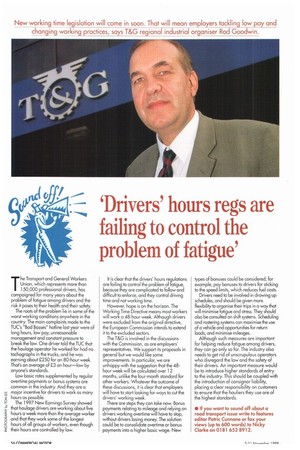'Drivers' hours regs are failing to control the problem of fatigue'
Page 58

If you've noticed an error in this article please click here to report it so we can fix it.
New working time legislation will come in soon. That will mean employers tackling low pay and changing working practices, says T&G regional industrial organiser Rod Goodwin.
The Transport and General Workers Union, which represents more than 150,000 professional drivers, has campaigned for many years about the problem of fatigue among drivers and the risk it poses to their health and their safety.
The roots of the problem lie in some of the worst working conditions anywhere in the country. The main complaints made to the TUC's "Bad Bosses" hotline last year were of long hours, low pay, unreasonable management anciconstant pressure to break the law. One driver told the TUC that the haulage operator he worked for had no tachographs in the trucks, and he was earning about £250 for an 80-hour week. That's an average of £3 an hour—low by anyone's standards.
Low basic rates supplemented by regular overtime payments or bonus systems are common in the industry. And they are a major incentive for drivers to work as many hours as possible. P The 1997 New Earnings Survey showed that haulage drivers are working about five I hours a week more than the average worker <
('S and that they work some of the longest oP hours of all groups of workers, even though 1 their hours are controlled by law.
It is clear that the drivers' hours regulations are failing to control the problem of fatigue, because they are complicated to follow and difficult to enforce, and they control driving time and not working time. However, hope is on the horizon. The Working Time Directive means most workers will work a 48-hour week. Although drivers were excluded from the original directive, the European Commission intends to extend it to the excluded sectors.
The T&G is involved in the discussions with the Commission, as are employers' representatives. We support its proposals in general but we would like some improvements. In particular, we are unhappy with the suggestion that the 48hour week will be calculated over 12 months, unlike the four-month standard for other workers. Whatever the outcome of these discussions, it is clear that employers will have to start looking for ways to cut the drivers' working week. There are steps they can take now. Bonus payments relating to mileage and relying on drivers working overtime will have to stop, without drivers losing money. The solution could be to consolidate overtime or bonus payments into a higher basic wage. New types of bonuses could be considered; for example, pay bonuses to drivers for sticking to the speed limits, which reduces fuel costs. Drivers need to be involved in drawing up schedules, and should be given more flexibility to organise their trips in a way that will minimise fatigue and stress. They should also be consulted on shift systems. Scheduling and rostering systems can maximise the use of a vehicle and opportunities for return loads, and minimise mileages. Although such measures are important for helping reduce fatigue among drivers, they can go only so far. The industry also needs to get rid of unscrupulous operators who disregard the law and the safety of their drivers. An important measure would be to introduce higher standards of entry to the industry. This should be coupled with the introduction of consignor liability, placing a clear responsibility on customers to ensure that the hauliers they use are of the highest standards.
• If you want to sound off about a road transport issue write to features editor Patric Cunnane or fax your views (up to 600 words) to Nicky Clarke on 0181 652 8912.


























































































































